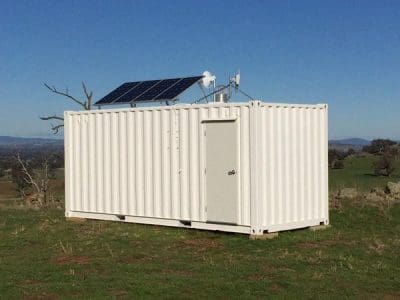Here’s our pick of recent articles appearing on our new Grain Central website…
Editor’s note: We’ve received inquiries from readers across Australia about the story below, asking about the cost of the installation. It’s an obvious question that we put to Mr Scholz during the course of our original interview. He was originally reluctant to talk figures, but given the interest that’s been shown since this item first appeared, we went back to him again. He’s told us the all-up cost was $9000.
DETERMINED to do something about having half his farm, including the family home, in a blackspot for NBN coverage, southern NSW farmer Murray Scholz decided to take matters into his own hands, setting up his own relay station to beam the signal to the house.
Mr Scholz installed the relay station in a shipping container two kilometres from the house on his mixed farm north-east of Culcairn.

A relay station set up in a container 2km from the house has dramatically improved internet connectivity on Murray Scholz’s farm at Culcairn in southern NSW.
Linking the home indirectly into NBN coverage has given him and his family the full benefits of phone and internet coverage equal to their city cousins.
“Our area has NBN fixed wireless. Unfortunately, our house isn’t in the coverage area, even though about half our farm is. So we decided to get a relay station and send the signal to our house,” he said.
It was a tortuous process convincing the telecommunications authorities to accept the idea and give the family the go-ahead to install their own facility.
“It took us six months. We initially told them what we wanted to do and they said no. I told my local member and the minister for communications what we wanted to do and both of them fully supported us. But the NBN still said no,” Mr Scholz said.
“I wasn’t going to let them beat us. I looked at the NBN website and our paddock had its own address. So I rang NBN and said I wanted to put the internet onto that address. But they said my house wasn’t there. I said no, I want a business account and they said okay.”
With assistance from Albury-based CoxTech, Mr Scholz put a shipping container on a part of the farm where there was line of sight to the nearest NBN fixed wireless tower.
They fitted the container with solar panels and batteries and set up a virtual ethernet cable linking two dishes – one on the container in line of site to another on the house.
The access to high speed internet has transformed life on the farm.
“Before we had NBN our average download speeds were 0.3 megabytes a second. Today it is 47 megabytes a second,” Mr Scholz said.
“Our download limits have gone from 30 gigabytes a month that we had to ration, to a total of 500 gigs a month, of which we regularly use about 300 gigs.
“That has let us do things like cloud computing that just wasn’t even considered beforehand.
“It has made a huge difference. It’s like going from a pushbike to a Porsche.”
Mr Scholz said in addition to being an invaluable asset for running the farm business, the facility had many benefits for the family and their life on the farm.
“My wife, Emma, works part time from home. It has made a huge difference to her work because all her work is web-based. Her productivity has gone up massively,” he said.
“Another benefit is the lifestyle aspect. As people in rural areas we shouldn’t be embarrassed that we want to use the internet for lifestyle because everyone in the city does. It lets us watch what we want on television when we want to watch it.”
Since the family has installed the relay station on the farm their neighbours have done the same, and they know of many other people who have adopted the concept.
Click here to access our new Grain Central.com website.




Obviously a smart move this to avoid the latency, speed and data cost issues associated with the Skymuster Satellite for any serious business user.
And even though it’s $9k, this will have a minimum 10 year lifespan with the LEAST expensive part, most likely the actual NBN receiver hardware upgradeable at any time still utilising the existing microwave link, secure enclosure and power source investment.
Great job!
Good on Murray – if he had waited for NBN to do this, it would never had happened. How about NBN advising the people in the Bush about exactly how to do this so they anybody can benefit from such improved service.
Thank you for the follow up. Professionalism as it’s meant to be. Cheers.
No story like this is complete without details of cost. Can you assist?
Thanks for your inquiry, Phil. We asked the question during the course of our interview with the subject, of course. He was originally reluctant to talk figures, but given the flood of interest we’ve had from readers, we went back to him to ask again. He’s now told us the all-up cost for the project was $9000. Editor